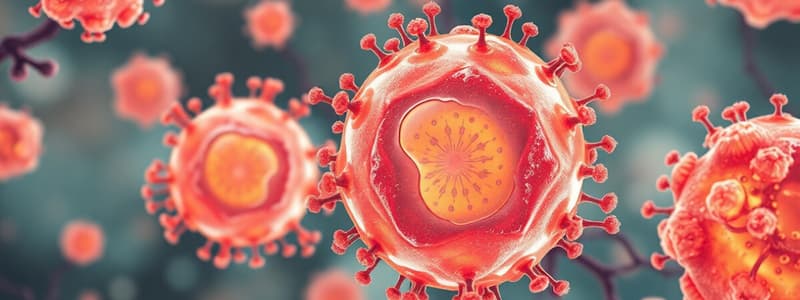Podcast
Questions and Answers
What is the primary function of T cells in the immune response?
What is the primary function of T cells in the immune response?
- To directly kill pathogens
- To orchestrate cell mediated immunity and regulate B cell response (correct)
- To produce antibodies
- To enhance innate immunity
How do T cell receptors recognize antigens?
How do T cell receptors recognize antigens?
- Through soluble antibody complexes
- In native form without any modifications
- By binding to antigens presented by MHC molecules (correct)
- By binding directly to the antigen
What distinguishes MHC class 1 from MHC class 2?
What distinguishes MHC class 1 from MHC class 2?
- MHC class 1 has one transmembrane domain (correct)
- MHC class 2 presents antigens to cytotoxic T cells
- MHC class 1 has two transmembrane domains
- MHC class 2 is present on all nucleated cells
Which statement is true about how B cell receptors differ from T cell receptors?
Which statement is true about how B cell receptors differ from T cell receptors?
Which type of antigen processing occurs within a virus-infected cell?
Which type of antigen processing occurs within a virus-infected cell?
Why is MHC important for T cell activation?
Why is MHC important for T cell activation?
What happens to T cells after they are specifically activated?
What happens to T cells after they are specifically activated?
What is a key difference between adaptive immunity and innate immunity regarding T cells?
What is a key difference between adaptive immunity and innate immunity regarding T cells?
What is the role of antibodies when dealing with smaller parasites?
What is the role of antibodies when dealing with smaller parasites?
How does the immune system respond to larger, antibody-coated parasites?
How does the immune system respond to larger, antibody-coated parasites?
In cases of immune system deficiency, what is a common consequence observed?
In cases of immune system deficiency, what is a common consequence observed?
What happens when there is a defect in the immune system's ability to recognize its own proteins?
What happens when there is a defect in the immune system's ability to recognize its own proteins?
What is the expected outcome when the immune system is functioning properly against tumors?
What is the expected outcome when the immune system is functioning properly against tumors?
Which scenario is indicative of a failure in immune system tolerance?
Which scenario is indicative of a failure in immune system tolerance?
What is considered the best method to enhance the immune response?
What is considered the best method to enhance the immune response?
What type of immune response occurs when there is a defect triggering allergy?
What type of immune response occurs when there is a defect triggering allergy?
What role do T helper cells play in the immune response to Mycobacterium?
What role do T helper cells play in the immune response to Mycobacterium?
What mechanism allows T helper cells to recognize Mycobacterium-infected macrophages?
What mechanism allows T helper cells to recognize Mycobacterium-infected macrophages?
What cytokine do T helper cells release to communicate with macrophages?
What cytokine do T helper cells release to communicate with macrophages?
Which process is necessary for the effective killing of intracellular bacteria by macrophages?
Which process is necessary for the effective killing of intracellular bacteria by macrophages?
What is the primary feature of the TH1 immune response?
What is the primary feature of the TH1 immune response?
How does the activation of B cells occur in relation to T helper cells?
How does the activation of B cells occur in relation to T helper cells?
What type of helper T cells specifically assist in B cell activation?
What type of helper T cells specifically assist in B cell activation?
Which of the following statements about T cell receptors is true?
Which of the following statements about T cell receptors is true?
What is the primary benefit of vaccination according to the content?
What is the primary benefit of vaccination according to the content?
Which of the following diseases has not had an effective vaccine developed?
Which of the following diseases has not had an effective vaccine developed?
How did the incidence of diphtheria change after the vaccine was introduced?
How did the incidence of diphtheria change after the vaccine was introduced?
What type of vaccine is primarily used for polio in India?
What type of vaccine is primarily used for polio in India?
Why is vaccination not always effective according to the content?
Why is vaccination not always effective according to the content?
In what time frame did the incidence of polio start to significantly decrease after vaccination efforts began?
In what time frame did the incidence of polio start to significantly decrease after vaccination efforts began?
What was the trend in measles cases after effective vaccination was implemented?
What was the trend in measles cases after effective vaccination was implemented?
How does proper vaccination timing affect disease occurrence?
How does proper vaccination timing affect disease occurrence?
What is subacute sclerosing panencephalitis (SSP)?
What is subacute sclerosing panencephalitis (SSP)?
In healthy individuals, what role does the immune system play regarding diseases?
In healthy individuals, what role does the immune system play regarding diseases?
Why is studying immunology considered important?
Why is studying immunology considered important?
What is a significant concern regarding antibiotics mentioned in the content?
What is a significant concern regarding antibiotics mentioned in the content?
What happens to the likelihood of diseases in AIDS patients according to the content?
What happens to the likelihood of diseases in AIDS patients according to the content?
What is the potential outcome of further understanding the immune system?
What is the potential outcome of further understanding the immune system?
How does the content describe the overall functioning of the immune system?
How does the content describe the overall functioning of the immune system?
What is the main focus of ongoing research in immunology as mentioned?
What is the main focus of ongoing research in immunology as mentioned?
Study Notes
T Cell Effector Mechanisms
- T cells are responsible for cell-mediated immunity, which helps regulate B cell responses to most antigens.
- T cells must be specifically activated against a particular pathogen or antigen, unlike innate immunity.
- T cell receptors cannot recognize antigens in their native state, they require help from MHC (Major Histocompatibility Complex) molecules.
- MHC Class 1 and MHC Class 2 are the two types of MHC molecules.
- The differences between MHC Class 1 and MHC Class 2 include the number of transmembrane domains anchoring them to the cell membrane. MHC Class 1 has one transmembrane domain, while MHC Class 2 has two.
MHC Class 2 and T Helper Cells
- MHC Class 2 molecules present processed antigens on the surface of macrophages. This process is crucial for the recognition of intracellular pathogens like Mycobacterium.
- When a macrophage presents a foreign antigen on MHC Class 2, T helper cells recognize the antigen, activating them.
- Activated T helper cells release cytokines like interferon gamma, which signals macrophages to fuse with lysosomes to kill intracellular bacteria. This is called the TH1 response.
The Importance of T Helper Cells in B Cell Activation
- T helper cells are also essential for the activation of B cells.
- B cells can directly interact with antigens, but this interaction alone is not sufficient to activate them.
- B cells need an additional signal from T follicular helper cells to become fully activated.
Different Immune Responses Based on Pathogen Size
- Antibodies play a role in fighting smaller parasites, binding to them directly.
- The TH1 response is triggered by intracellular pathogens.
- Eosinophils are crucial in killing larger parasites coated with antibodies.
Immune Deficiencies and Their Consequences
- Immune deficiencies can result from inherited or acquired defects in the immune system.
- Recurrent infections occur when the immune system is deficient, as it cannot properly fight off pathogens.
- Allergy is a normal response to innocuous substances, but deficiencies can lead to an absence of allergic reactions.
- Organ rejection after transplantation is a normal response of the immune system, however, deficiencies can lead to acceptance of grafted organs.
- Autoimmunity occurs when the immune system fails to recognize its own proteins or tissues, leading to a reaction against the body's own cells.
Vaccination as the Best Protection
- Vaccination is the most effective way to induce immunity against specific diseases.
- Vaccines help train the immune system, preventing the development of diseases altogether.
- Unfortunately, not all diseases have effective vaccines yet. For example, there are currently no effective vaccines against HIV or malaria.
Examples of Highly Effective Vaccines
- Diphtheria vaccine has dramatically reduced cases of the disease since its introduction in 1945.
- Polio vaccination has drastically decreased polio cases, particularly in India.
- Measles vaccine has significantly lowered measles cases and the rare complication known as subacute sclerosing panencephalitis (SSP).
The Importance of Studying and Researching the Immune System
- The human immune system is remarkably complex and still not fully understood.
- Ongoing research is crucial to better understand and manipulate the immune system.
- Further research opens up possibilities for developing new, more effective vaccines and combating infectious diseases.
- Future research is also essential for understanding antibiotic resistance and finding new ways to fight bacterial infections.
Studying That Suits You
Use AI to generate personalized quizzes and flashcards to suit your learning preferences.
Related Documents
Description
Explore the mechanisms of T cell effector functions and the role of MHC Class 2 molecules in the immune response. This quiz covers topics like cell-mediated immunity, the differences between MHC Class 1 and Class 2, and the activation of T helper cells. Test your knowledge on how T cells interact with antigens and regulate immune responses.



